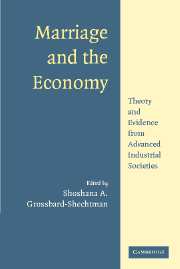Book contents
- Frontmatter
- Contents
- List of Figures
- List of Tables
- List of Contributors
- Foreword
- Acknowledgments
- Marriage and the Economy
- 1 Marriage and the Economy
- PART I THE ECONOMICS OF MARRIAGE AND DIVORCE
- PART II EFFECTS OF MARRIAGE ON INCOME USES
- PART III EFFECTS OF MARRIAGE ON TIME USES
- PART IV MARRIAGE AND THE MACROECONOMY
- Index
1 - Marriage and the Economy
Published online by Cambridge University Press: 07 December 2009
- Frontmatter
- Contents
- List of Figures
- List of Tables
- List of Contributors
- Foreword
- Acknowledgments
- Marriage and the Economy
- 1 Marriage and the Economy
- PART I THE ECONOMICS OF MARRIAGE AND DIVORCE
- PART II EFFECTS OF MARRIAGE ON INCOME USES
- PART III EFFECTS OF MARRIAGE ON TIME USES
- PART IV MARRIAGE AND THE MACROECONOMY
- Index
Summary
The institution of marriage is found in nearly all human societies. This fact clearly reflects the importance of sexual and reproductive functions in human life. Marriage entails commitment between sexual partners. Why do societies develop marital institutions that encourage commitment between spouses? In her presidential address to the Population Association of America in 1995, Linda Waite, a professor of sociology at the University of Chicago, emphasized how commitment in marriage can benefit earnings. Married workers may earn more because they are more productive. Marriage and the Economy extends the work by Waite and others by exploring more in depth how marriage possibly influences labor supply and workers' productivity and by presenting analyses of other channels by which marriage may have an impact on thee conomy: savings, consumption, and government programs such as welfare programs and social security.
This book is an economics book because it deals with the “economy,” the part of society that centers around exchanges of goods and services. The “economy” is an aggregate and involves a macroeconomic perspective. Until recently it was standard practice to focus on monetized transactions when calculating the value of an economy, and to overlook the value of the non-monetary household economy. Marriage influences the household economy at least as much as it affects the monetized economy. Marriage and the Economy adds to our understanding of how marriage influences both the monetized economy and the household economy. Marriage institutions are to the household economy what business institutions are to the monetized economy.
- Type
- Chapter
- Information
- Marriage and the EconomyTheory and Evidence from Advanced Industrial Societies, pp. 1 - 34Publisher: Cambridge University PressPrint publication year: 2003
- 11
- Cited by



